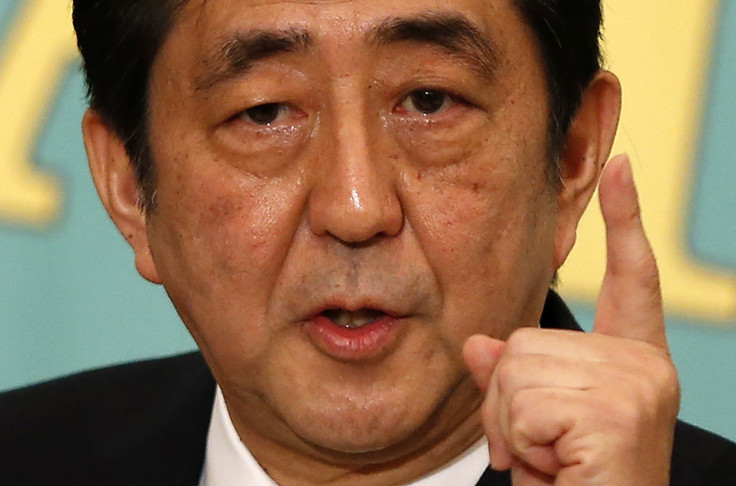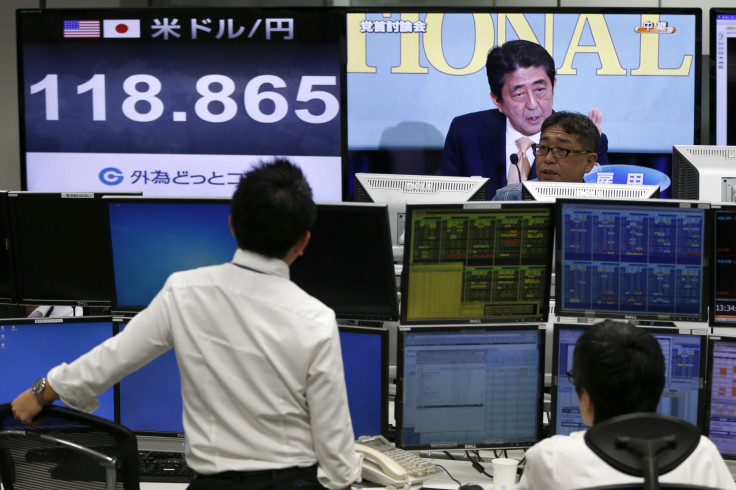What Moody's Downgrade Means For Abe, Japan

Moody’s Investor Services downgraded Japan’s national credit rating on Monday, following Japan’s slip into a technical recession and Prime Minister Shinzo Abe’s decision last month to hold a snap election in mid-December. The downgrade shot the yen to a seven-year low against the U.S. dollar and damaged futures of the Nikkei average and of Japanese government bonds.
Moody’s downgraded the world’s third-largest economy one grade on its credit rating scale from the fourth-best Aa3 rating to the A1 rating, citing “heightened uncertainty over the achievability of fiscal deficit reduction goals,” according to Reuters. An A1 rating is still considered a high grade rating with a good outlook on returns on loans.
A sovereign credit downgrade would make it harder for Japan to borrow on the international market. It will also likely hurt the confidence of investors looking to get into the Japanese market, signaled by a drop in futures on the Tokyo Stock Exchange and for government bonds on Monday. Nikkei futures dropped 0.7 percent, while Japanese Government Bonds, or JGBs, dropped 0.06 percent in after-hours trading.
The Moody’s downgrade was the first such for Japan by one of the three big credit rating agencies since mid-2012, when Fitch downgraded Japan to its equivalent of an A1 rating over Japan's rising public debt. Abe took office seven months later.
The downgrade will hurt Abe's popularity going into the snap elections, scheduled for Dec. 14, according to Kazuhiko Ogata, chief Japan economist at Credit Agricole SA, according to Bloomberg.
"This serves as a good reminder to Japanese voters that the country's fiscal situation is terrible," he said, adding that Abe needed to focus less on "fiscal consolidation" and more on boosting the Japanese economy out of stagnation.
Despite the recession and doubt over Abe's policies, the 60-year-old remained ahead in recent polls ahead of the snap parliamentary election, which critics say he called for lack of a better option, according to the Wall Street Journal. His popularity is at its lowest; only 39 percent of voters polled by Asahi Shimbun, a Japanese daily, approved of his performance, while 51 percent of voters in a Nikkei poll disapproved of his fiscal policies as of mid-November.
His Liberal Democratic Party is expected to weather the storm: only 11 percent and 9 percent of voters in the Asahi and Nikkei polls, respectively, said they'd vote for the main opposition party, the Democratic Party of Japan.

Abe has spent much of his two years in office trying to pull Japan out of 20 years of relative economic stagnation, but the Japanese economy shrank 7.1 percent in the second quarter of 2014 and 1.6 percent in the third quarter of 2014 following a hike in the national sales tax from 5 percent to 8 percent. The Abe government said April’s hike would raise $77 billion each year, but it sent household spending through the floor, curbing growth, according to the Wall Street Journal.
The negative growth compelled the Japanese government to delay a second planned hike from 8 percent to 10 percent scheduled for October 2015 by 18 months and prompted Abe to seek a referendum on his “Abenomics” economic policy.
The snap parliamentary elections are seen by some experts as a proactive move by Abe to solidify his public support before he becomes too unpopular. Abe’s eponymous economic policy involves government spending to stimulate the economy, pursuing business-friendly policies and inflating the yen by pumping money into circulation.
Critics say Abenomics has done little to help small business owners, the lower class, and middle-class Japanese.
© Copyright IBTimes 2025. All rights reserved.





















